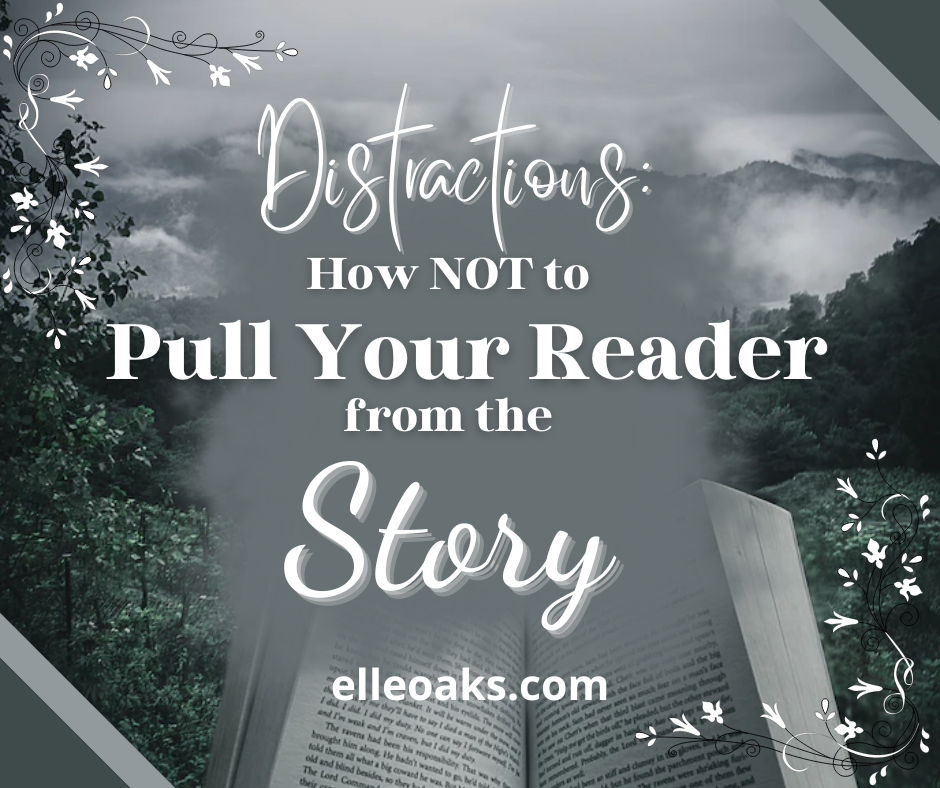When an audience says they couldn’t get through a story, what do they mean? In fantasy and sci-fi, a reader should and will understand that it is a work of fiction. They will suspend disbelief. So, what is it that pull them from the story? We’ll go over some examples of distractions for readers and inconsistencies a writer should be aware of when writing and editing.

As a writer of fantasy for all ages, I want my audience to dive deep and truly experience the world and story I’m laying out in front of them. Anything that may pull the reader away or cause them to think twice can create a barrier from them being able to disappear from reality for the time being.
This article will cover some of the ways your story may be distracting for readers. We’ll cover what you’ll need to know as you go through the editing phase and things to look out for. Let’s begin.
1. Words
Words. Obviously, a novel has plenty of them. But why would words pull a reader from the story? Let me show you how.
First is word variation.
Word variation means using synonymous terms or other names for characters so the text does not feel so repetitive. Using the same word over and over and over again is not as sneaky as you might think. As we write , our minds default to certain words. That’s how we speak. The words we feel comfortable with using. But when you use the same word too many times, it can distract the reader and pull them from the story.
These words are referred to as “cinnamon words.” You sprinkle them several times throughout the story and now the readers will know your writing style form book to book.
I’m not saying use a word once and only once. No. I’m saying that if you are going to introduce someone as the pale kid, with greasy obsidian hair, don’t say this same exact thing every time they enter the room.
Another that pulls me from the story are large words not used in everyday speech used several times on the same page and then never used again. Always gives me a chuckle as I like to believe the writer must have just learned the word and was eager to use it.
Using large vocabulary is not a bad thing. But the fact that it can be a distraction and pull a reader from the story can cause for some problems. It’s also an issue of accessibility. A writer may lose readers if the audience has to read with a dictionary by their side.
2. Stereotypes
There’s nothing like being pulled from a story because of an overused or harmful stereotype. You’d think sci-fi and fantasy at least should be immune from this.
They aren’t.
Often time real world influences and stereotypes creep in. Sometimes fantasy races take on or portray a culture the reader may be familiar with. Sometimes an event very similar to one in our own history occurs. These can be harmful and sometimes triggering to the audience.
You do not want a reader to put down your book because you, the writer, did not handle a subject with the amount of sensitivity needed.
Always ensure that your beta readers or editors pay close attention to such details. They will be your first response in ensuring your book or you the author doesn’t get “canceled.”
3. Names
While it may sound silly, odd, long, or un-pronounceable names will pull the reader straight out of the story. Too many vowels or consonants in a row cause the reader pause and wonder of how in the world to say that name. It breaks flow.
Fantasy can be wonderment and imagination but try to keep naming mechanics simple and easy for the reader to pick up on. Spin a familiar name by replacing a letter or two. Combine two names together. Look back in history and find names not often used anymore to add flare.
There are simple tricks to ensure your audience doesn’t get lost in the names. It’s important to remember that a part of sales or pageviews comes from recommendations. If a reader does manage to finish your book with names like L’mi’oo’oo’oo’kiki, what are the odds they’ll even be able to summarize or remember what actually happened in the narrative? What are the odds they’ll even be able to spell that without looking back at that text?
Be inventive. Use your imagination. Just don’t get too carried away.
Conclusion
There you have it. These are just some of the distractions the reader may come across if they read your novel and you came unprepared. Just remember, this is a very general list. There are other things that may pull a reader away from your story that are not mentioned above.
Everyone expects something different in what they are reading. Not everyone will love your book, but that doesn’t mean you shouldn’t try to make it the best it can be.
Did I miss something? Let me know in the comments below what you pulls you out of a story faster than you can say “Hocus Pocus!”!
Like this post? Share on your socials!
If you are a reader, take a look at our books! Click here!

Questions or ideas about future posts? Contact us on our form! Click here.

